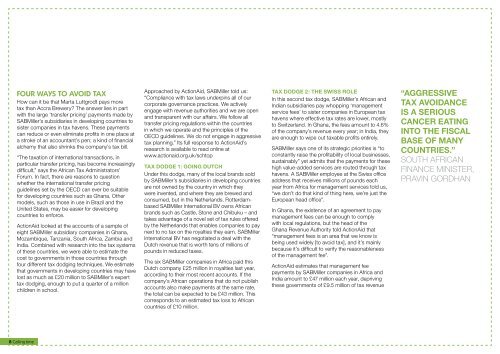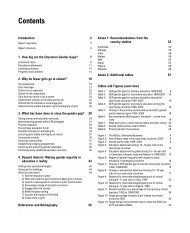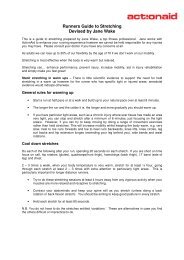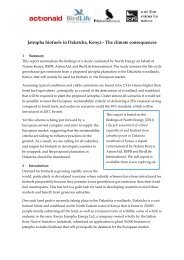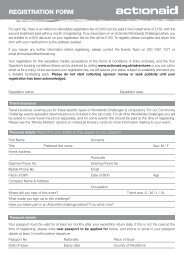You also want an ePaper? Increase the reach of your titles
YUMPU automatically turns print PDFs into web optimized ePapers that Google loves.
four Ways to avoid tax<br />
How can it be that Marta Luttgrodt pays more<br />
tax than Accra Brewery? The answer lies in part<br />
with the large ‘transfer pricing’ payments made by<br />
SABMiller’s subsidiaries in developing countries to<br />
sister companies in tax havens. These payments<br />
can reduce or even eliminate profits in one place at<br />
a stroke of an accountant’s pen; a kind of financial<br />
alchemy that also shrinks the company’s tax bill.<br />
“The taxation of international transactions, in<br />
particular transfer pricing, has become increasingly<br />
difficult,” says the African Tax Administrators’<br />
Forum. In fact, there are reasons to question<br />
whether the international transfer pricing<br />
guidelines set by the OECD can ever be suitable<br />
for developing countries such as Ghana. Other<br />
models, such as those in use in Brazil and the<br />
United States, may be easier for developing<br />
countries to enforce.<br />
<strong>ActionAid</strong> looked at the accounts of a sample of<br />
eight SABMiller subsidiary companies in Ghana,<br />
Mozambique, Tanzania, South Africa, Zambia and<br />
India. Combined with research into the tax systems<br />
of these countries, we were able to estimate the<br />
cost to governments in those countries through<br />
four different tax dodging techniques. We estimate<br />
that governments in developing countries may have<br />
lost as much as £20 million to SABMiller’s expert<br />
tax dodging, enough to put a quarter of a million<br />
children in school.<br />
8 <strong>Calling</strong> time<br />
Approached by <strong>ActionAid</strong>, SABMiller told us:<br />
“Compliance with tax laws underpins all of our<br />
corporate governance practices. We actively<br />
engage with revenue authorities and we are open<br />
and transparent with our affairs. We follow all<br />
transfer pricing regulations within the countries<br />
in which we operate and the principles of the<br />
OECD guidelines. We do not engage in aggressive<br />
tax planning.” Its full response to <strong>ActionAid</strong>’s<br />
research is available to read online at<br />
www.actionaid.org.uk/schtop<br />
TAx DoDge 1: goIng DuTCh<br />
Under this dodge, many of the local brands sold<br />
by SABMiller’s subsidiaries in developing countries<br />
are not owned by the country in which they<br />
were invented, and where they are brewed and<br />
consumed, but in the Netherlands. Rotterdambased<br />
SABMiller International BV owns African<br />
brands such as Castle, Stone and Chibuku – and<br />
takes advantage of a novel set of tax rules offered<br />
by the Netherlands that enables companies to pay<br />
next to no tax on the royalties they earn. SABMiller<br />
International BV has negotiated a deal with the<br />
Dutch revenue that is worth tens of millions of<br />
pounds in reduced taxes.<br />
The six SABMiller companies in Africa paid this<br />
Dutch company £25 million in royalties last year,<br />
according to their most recent accounts. If the<br />
company’s African operations that do not publish<br />
accounts also make payments at the same rate,<br />
the total can be expected to be £43 million. This<br />
corresponds to an estimated tax loss to African<br />
countries of £10 million.<br />
TAx DoDge 2: The SWISS Role<br />
In this second tax dodge, SABMiller’s African and<br />
Indian subsidiaries pay whopping ‘management<br />
service fees’ to sister companies in European tax<br />
havens where effective tax rates are lower, mostly<br />
to Switzerland. In Ghana, the fees amount to 4.6%<br />
of the company’s revenue every year; in India, they<br />
are enough to wipe out taxable profits entirely.<br />
SABMiller says one of its strategic priorities is “to<br />
constantly raise the profitability of local businesses,<br />
sustainably” yet admits that the payments for these<br />
high value-added services are routed through tax<br />
havens. A SABMiller employee at the Swiss office<br />
address that receives millions of pounds each<br />
year from Africa for management services told us,<br />
“we don’t do that kind of thing here, we’re just the<br />
European head office”.<br />
In Ghana, the existence of an agreement to pay<br />
management fees can be enough to comply<br />
with local regulations, but the head of the<br />
Ghana Revenue Authority told <strong>ActionAid</strong> that<br />
“management fees is an area that we know is<br />
being used widely [to avoid tax], and it’s mainly<br />
because it’s difficult to verify the reasonableness<br />
of the management fee”.<br />
<strong>ActionAid</strong> estimates that management fee<br />
payments by SABMiller companies in Africa and<br />
India amount to £47 million each year, depriving<br />
these governments of £9.5 million of tax revenue<br />
“AggReSSIve<br />
TAx AvoIDAnCe<br />
IS A SeRIouS<br />
CAnCeR eATIng<br />
InTo The fISCAl<br />
bASe of MAny<br />
CounTRIeS.”<br />
SOUTH AFRICAN<br />
FINANCE MINISTER,<br />
PRAVIN GORDHAN


